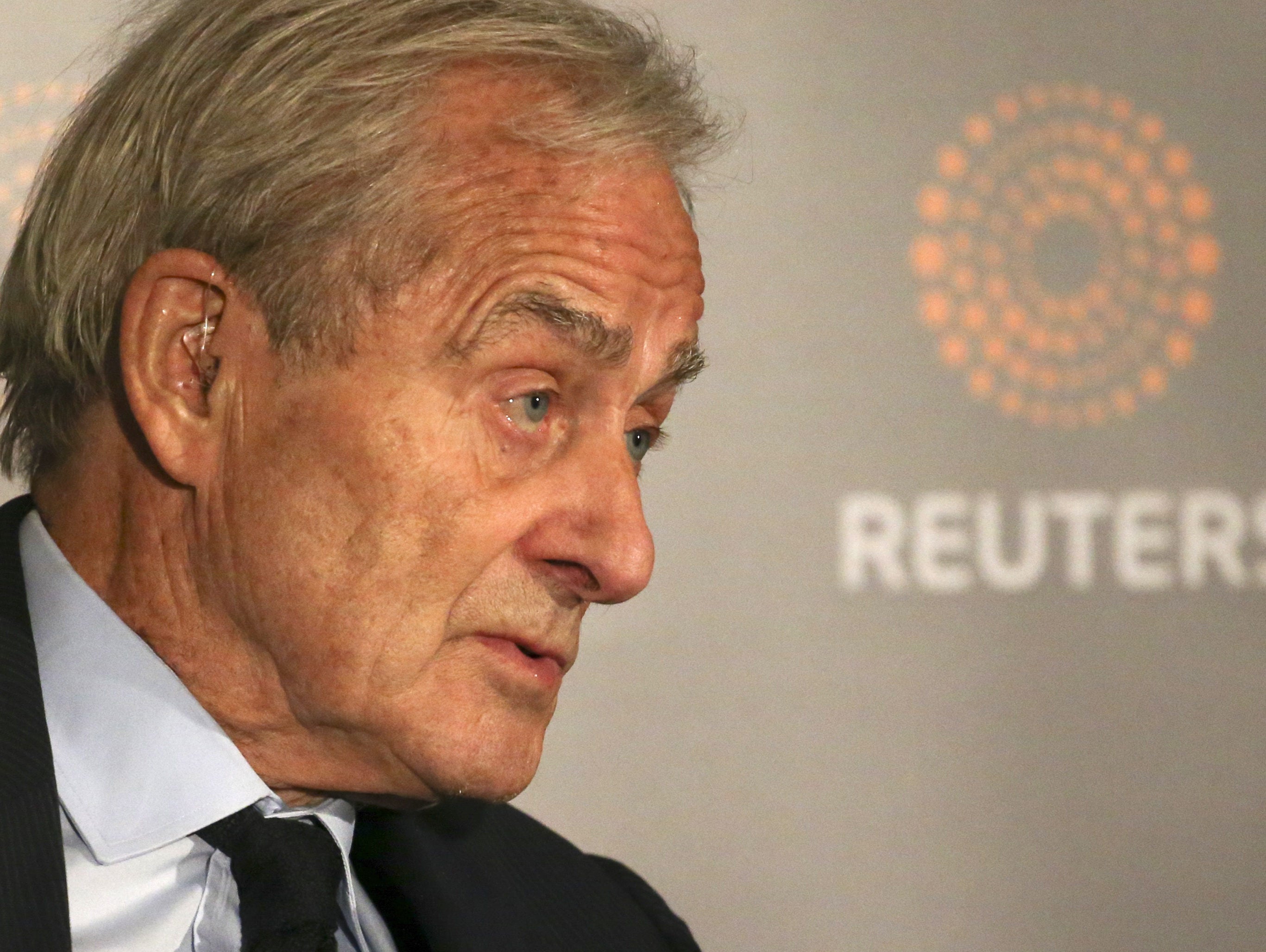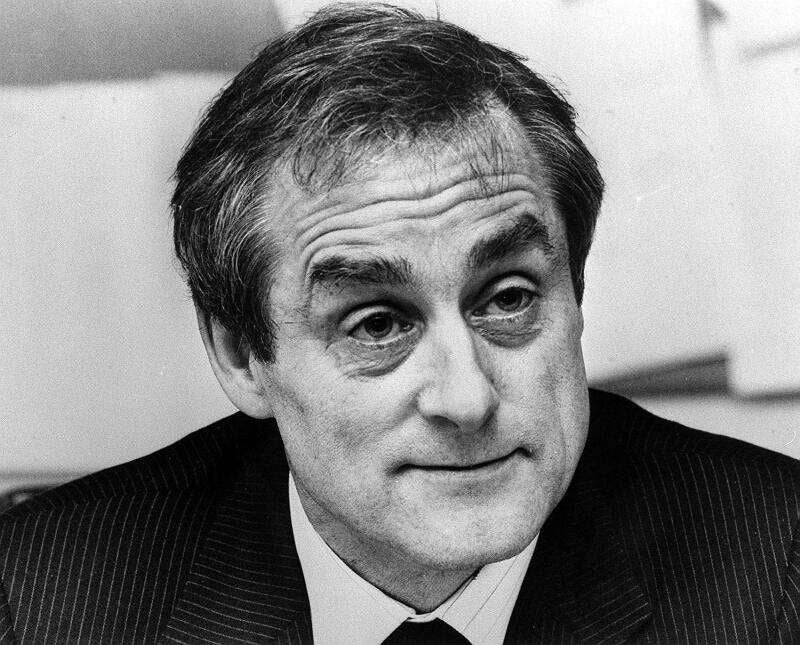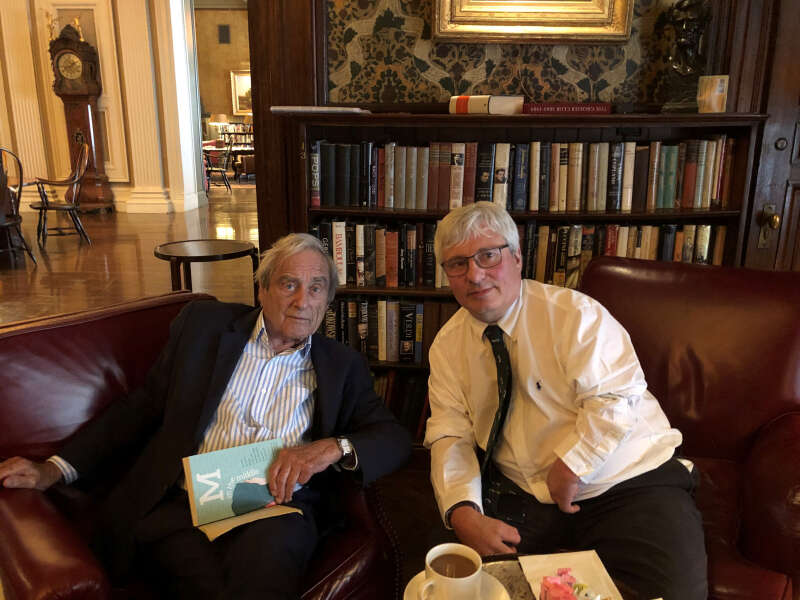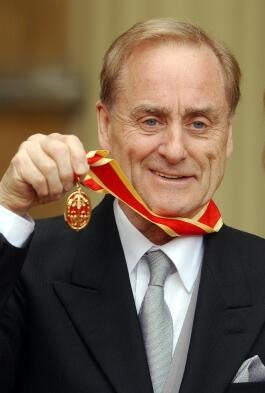
Sir Harold Evans was physically a diminutive figure – but through his journalism, books and comments about the trade he had a giant influence over generations of journalists.
Many have shared their thoughts about the impact Sir Harry has had on them since his death from heart failure aged 92 was announced this morning.
Former Northern Echo editor Peter Barron said: “As editor of The Northern Echo between 1999 & 2016, I’d often find myself looking at his picture on the office wall and wondering: ‘What would you do, Harry?’ 50 years after he left, North-East readers still talked of him in awe. A true inspiration.”
Writing for Reuters, award-winning investigative journalist Stephen Grey said: “He was the icon that inspired a generation of young Britons to pick up a pen in anger – inspired by his example that the relentless and carefully crafted exposure of facts could be used to fight injustice.”
Reuters editor in chief Stephen Adler said: “Harry Evans was an inspiration, not only as a great journalist but as a great man. He had an insatiable intellect, extraordinary tenacity, high principle, and a generous heart.”
Former Daily Mirror editor Piers Morgan said: “One of the all-time great newspaper editors. His stunning Thalidomide investigation when he ran the Sunday Times epitomised his crusading, campaigning, fearless style.
A wonderful journalist & a witty, charming, fiercely intelligent man.”
Even Prime Minister Boris Johnson, a former Times journalist himself, shared a tribute: “Sir Harold Evans worked his way up from local papers to become a giant of British journalism.
“He will always be remembered for exposing the thalidomide scandal and for tirelessly campaigning on behalf of those who were affected. A true pioneer of investigative journalism.”
An influential career
Evans was still making waves with his journalism this year for Reuters, where he remained editor at large until his death. His April op-ed comparing his memory of calming comments made by the future Queen Elizabeth in 1940 to her broadcast to the nation about the coronavirus crisis was highlighted on our list of excellent journalism about the pandemic.
Evans began his career as a journalist on a weekly in Ashton-under-Lyne at the age of 16 in 1944.
He was editor of the Northern Echo from 1961 to 67, editor of The Sunday Times from 1967 to 1981 and then editor of The Times for a year before resigning after clashing with owner Rupert Murdoch about editorial independence.

Sir Harold Evans in 1982. Picture: PA Wire/PA Images/File Photo
His books about journalism and his life included:
- Essential English for Journalists, Editors and Writers
- Editing and Design
- Pictures on a Page
- Good Times Bad Times
- My Paper Chase: True Stories of Vanished Times.
Then Guardian editor Alan Rusbridger said: “No journalist of my generation could escape Harry’s influence…we were all brought up on his text books. Everything we knew about constructing an intro, subbing, cropping a picture, designing a page or writing a headline we knew it because of Harry. It was drummed into us, at Harlow Tech in my case…He was to journalism what Doctor Spock was to child-rearing.
“The story that we want to believe about journalism and what great journalism is embodies a collection of these characteristics: these people are brave, they stand up for people when they are most needed, they stand up against authority and bullies, they are not easily intimidated, they write about big things – the things that really matter.
“They hate injustice and when they see it they right wrongs. They never give up on a cause and they have a kind of moral outrage. And that’s Harry…
“He is the sort of journalist that in our hearts we would all like to be. He took on big targets that included Governments, and judges, spies, enormous corporations…they were people with deep pockets, who had a lot of legal and institutional muscle.
“He’s the journalist who reminds us all why we all wanted to be journalists. At a time when some people are giving journalism a bad name he is somebody who gave journalism a good name. He represents what we could be and what we should be.”
Then BBC head of news James Harding, who (like Evans) left The Times after a falling out with owner Murdoch, said: “You transformed Fleet Street and you transformed the lives of all of us by understanding and appreciating that investigative journalism defines us. It earns our troublesome place in society and it makes clear for every journalist that what we do, for all our flaws, is invaluable.
“It seems a little odd for us all to be here given Fleet Street’s recent appetite for the circular firing squad. But we are here in this great group hug.
“It’s the most joyous gathering of newspaper people that I can remember. Entirely apt that is you who brought us together because in one form or another we all strive to do what you did in your editorships of the Sunday Times and the Times.”
Thalidomide scandal
Evans’ defining achievement was his exposure of the Thalidomide scandal.
In 1972, The Sunday Times sought to highlight the plight of the 370 known victims of the drug Thalidomide, which caused major birth deformities in babies.

Sir Harold Evans (left) with Thalidomide campaigner Guy Tweedy, from Harrogate, who last met up with his “dear friend” at his New York Club in July 2019. Picture: PA Media/Guy Tweedy
The UK distributor of the drug, Distillers, had offered the victims total compensation of £3.25m. The Sunday Times campaign helped prompt Commons action and a shareholder revolt at Distillers.
A new compensation deal worth £32.5m was eventually agreed.
After fighting an injunction all the way to European Court, in 1976 The Sunday Times also revealed that the drug’s developers had not met the basic testing requirements of the time before distributing it.
In his own words
Evans was interviewed by Press Gazette in 2017 and spoke about America under Donald Trump, saying it seemed like “there’s no such thing as truth there is only what people believe, so therefore the truth becomes irrelevant”.
He added: “Good hard truth is very hard to establish but vital to defend when it is established. Otherwise everything else is relative.”

Fleet Street legend Sir Harold Evans at Buckingham Palace in London after he was knighted by the Prince of Wales for service to journalism in June 2004. Picture: PA Wire/PA Images/John Stillwell
On the subject of fake news, he rounded on the digital giants who allow it to flourish.
He said: “Zuckerberg and Google and company are disgraceful, they have huge amounts of money which is inverse in proportion to the level of their conscience and competence. Don’t tell me people who are worth hundreds of billions of dollars can’t detect fake news and stop fake news.
“Fake news for instance like the Pope is going to vote for Donald Trump and Hilary Clinton is going to let all the criminals out of prison. Those appear on these websites. Is anybody there in charge? They are too busy counting the money. That is a real threat.”
He said: “Facebook and Google are platforms, distributors, with none of the attendant standards of the best journalism. They bring a vast carelessness to political news and social responsibility. They are not media companies, with reporters, fact checkers, editors. They don’t send reporters to Syria, don’t investigate corruption. They have no institutional memory.”
Perhaps the last word should go to Guy Tweedy of the Thalidomide Trust, who also spoke to Press Gazette in 2017 and revealed how Sir Harold had continued to help those afflicted by Thalidomide and support an ongoing campaign which has secured payouts worth €5bn for those deformed by the drug around Europe over the previous decade.
Tweedy, who is himself a victim of Thalidomide, said: “Harold Evans is one of the most important people in my life for what he did for those affected by Thalidomide in the 1970s. If he hadn’t done what he had done in 1973 I don’t think there would be a Thalidomide Trust.”
Email pged@pressgazette.co.uk to point out mistakes, provide story tips or send in a letter for publication on our "Letters Page" blog

